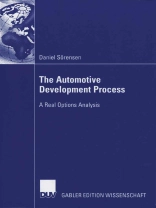global automotive industry currently undergoing substantial changes the way firms compete. Driving forces behind these changes globalized markets, technologies, more demanding customers. structures are evolving within the automotive companies, there increased evidence of the importance of we- functioning networks order to gain a competitive advantage. The benchmarks for the automotive companies the demands for higher product quality, more efficiency bringing products to markets, a reduction of time to market. above changes present the starting point for the research by Daniel which deals with the product development process, particular within the automobile industry. It a subject, which to now hasn’t been satisfactorily treated. Daniel sets out to explain value the engineering product development paradigms of point- set-based concurrent engineering from a holistic viewpoint. First of all, identifies select capabilities based empirical studies of best practice current automotive product development, particular at Toyota Motor Corporation. This a pronounced understanding of why different product engineering systems able to yield a competitive advantage the market. Second of all, applies a real option valuation model to these capabilities within a financial economics framework order to quantify from the viewpoint of shareholders the value of poi- concurrent engineering respectively. In this way, automotive firms are given a powerful tool, which enables them to identify the optimal amount of innovation to build into the product development process. Finally, Daniel establishes five clear principles of product development, which give significant direction for automotive executives designing controlling the product development process optimally uncertain dynamic environment.
表中的内容
The Automotive Development Process.- Competitive Advantage and the Automotive Development Process.- Real Option Model of the Automotive Development Process.- Optimizing the Automotive Development Process.- Conclusion.
关于作者
Dr. Daniel Sörensen promovierte bei Prof. Dr. Henry Schäfer am Lehrstuhl für Allgemeine Betriebswirtschaftslehre und Finanzwirtschaft an der Universität Stuttgart. Er ist als Habilitant bei Prof. Dr. Henry Schäfer in Stuttgart tätig.












